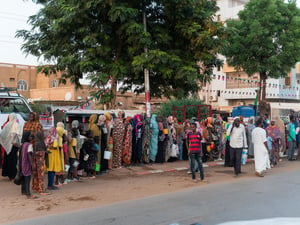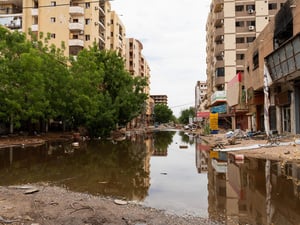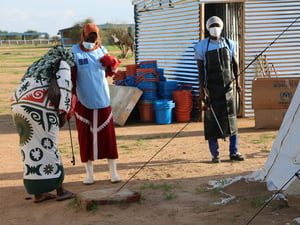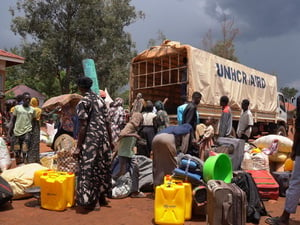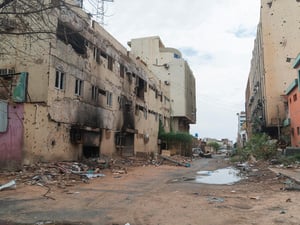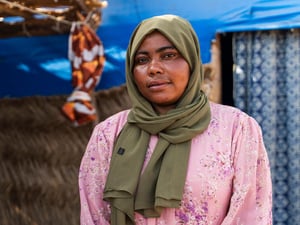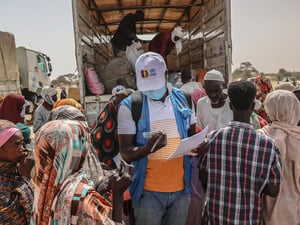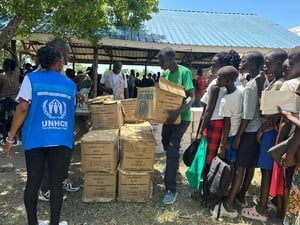Eritreans head home from Sudan after decades in exile
Eritreans head home from Sudan after decades in exile

Eritrean refugees head home from Sudan in a truck convoy.
TESSENEY, Eritrea (UNHCR) - More than 1,600 of Africa's longest-standing refugees have now returned home in an exercise that has seen UNHCR acting as a confidence-building bridge between neighbours Sudan and Eritrea.
UNHCR has helped the Eritreans - some of whom were born in exile since the 1960s and have never seen their homeland - return to Eritrea in four convoys from Sudan starting June 23. The fifth and last planned convoy of the season moved on Tuesday (July 8), taking 240 refugees and their possessions from camps in eastern Sudan before the rainy season starts in earnest.
"It was really magnificent to see people returning home," said UNHCR's representative in Sudan Ahmed Farah, who accompanied the first convoy in June. "The returnees got a magnificent reception." Representatives of ERREC (the Eritrean Relief and Refugee Commission) "were very excited to receive their own back," added Farah.
Resumption of the convoys - suspended in July, 2002 for last year's rainy season - had been delayed for eight months by border tensions between Sudan and Eritrea. The border area still remains closed to civilian traffic, but UNHCR managed to persuade the two governments to open a humanitarian corridor to allow the passage of return convoys.
"Modestly, at our level, we managed to make a breakthrough," said Farah. "I don't want to claim too much, but it has been a good breakthrough [in relations between Sudan and Eritrea], and if it has reverberations further, all the better."
On the other side of the border, Cristian Koch, UNHCR's top official in Eritrea, agreed that "the fact of reassuming the operation on ad hoc agreement by both sides is an important confidence-building step between the two countries."
In one of the most recent convoys, last Saturday, 654 individuals returned home in 15 passenger buses. They were accompanied by 50 trucks and 21 trailers carrying the refugees' possessions, in addition to four trucks that transported their livestock.
Saturday's convoy reached the border in good time, despite three days of heavy rain that had made the roads difficult to navigate. It brought to 1,412 individuals (grouped in 578 families) the number of refugees who have returned home since June 23.
The convoys cross the border between the towns of Laffa in Sudan and Talatasher in Eritrea. At a transit point at the border, their luggage and livestock are transferred to waiting trucks, and the returnees are taken to a transit centre in the Eritrean border town of Tesseney. Many are proceeding to their villages of origin near Tesseney after receiving a cash grant, basic household supplied and three months' worth of food supplied by the UN World Food Programme.
UNHCR's Farah said even UNHCR officials found the return a moving occasion. "After many months of waiting to open the border, it was a wonderful feeling, very emotional."
After the usual suspension for the rainy season, convoys are scheduled to resume again in September to assist thousands of Eritrean refugees in Sudan who have registered to go home. Since May 2001, 103,000 Eritrean refugees have returned from Sudan, more than 50,000 of them with UNHCR assistance.
In February, 2002, UNHCR announced that refugees from Eritrea - those who fled their country after the war of independence, as well as more recent refugees from the border conflict between Ethiopia and Eritrea - should no longer have a well-founded fear of persecution. This means they were no longer to be considered refugees after December 31, 2002, unless they can prove their individual circumstances justify such status.

